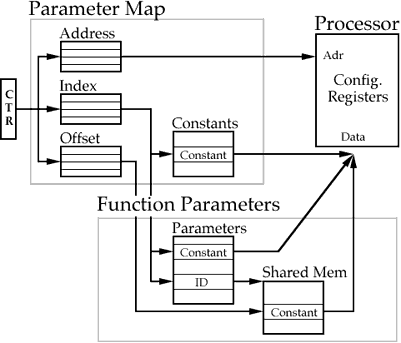
Using a Parameter Map to configure a function
There are two candidate mechanisms for implementing parameter passing for function implemented solely in hardware. One is to provide a software function for each standalone hardware function, which does any necessary pre-processing of the input parameters and writes them to the memory-mapped hardware configuration registers. The other is to provide a structure defining the mapping between parameters and hardware configuration registers, and use a generic loader to interpret the mapping in the context of a particular set of parameters.
While I believe the flexibility of the former is a deciding factor, I am testing the latter in this implementation. If it works, it will be easy to build self-configuring special purpose processors.
The loading of the hardware configuration registers takes place before beginning execution of the software component of a function. The software function will receive the function parameter list already used for loading hardware registers.
The parameter_map structure defines the mapping between parameters and hardware registers. It contains a list of write operations, each requiring an address and a pair of indices into the function parameters. In addition, tagged constants (using the same format as the parameters list) are stored in a constant pool, for storing hardware specific configuration values.

Using a Parameter Map to configure a function
A C version of the parameter_map structure is provided here:
#define MAX_PARAMETER_WRITES 64
#define PARAMETER_CONSTANT( constant ) (MAX_PARAMETER_WRITES + (constant))
#define PARAMETER_SCALAR 0xFFFE
#define PARAMETER_PASS_BY_NAME 0xFFFF
typedef struct parameter_write {
unsigned long address; /* address to write */
unsigned short index; /* index of parameter to write */
unsigned short offset; /* offset into aggregate parameters */
} parameter_write;
typedef struct parameter_map {
int num_writes; /* number of register writes */
parameter_write write[ MAX_PARAMETER_WRITES ]; /* register write descs */
parameter_t constant[ 1 ]; /* common pool of constants */
} parameter_map;